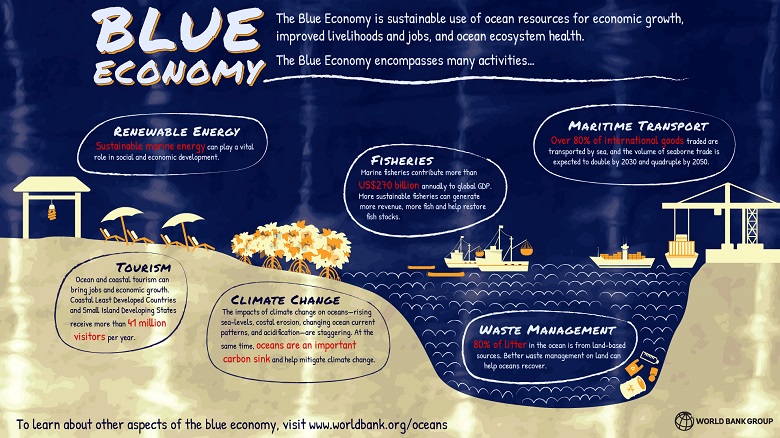The Blue Economy is a transformative concept introduced by economist and businessman Gunter Pauli, often described as Green Economy 2.0. It emphasizes creating sustainable business models that leverage ocean resources responsibly, aiming to achieve 100 innovations, create 100 million jobs in 10 years, and do so with zero emissions and no waste.
Pauli founded organizations such as the Zero Emissions Research Initiative (ZERI) and the Global ZERI Network to support these goals. These entities use scientific research and public outreach to identify and develop sustainable solutions. One of the key initiatives developed in collaboration with ZERI is the Blue Economy Alliance.
At its core, the Blue Economy promotes living with and from the ocean in a sustainable relationship. This concept integrates two essential dimensions:\n
- The provision of goods and services.
- The protection of property and life in ways that ensure sustainability for future generations.
The Blue Economy emphasizes innovative approaches to ocean resource management, preparing societies to adapt and mitigate challenges while factoring in both the costs and benefits as integral components of the broader economic system.

Achieving the Blue Economy Vision
For the Blue Economy to thrive, its principles must be embedded in national and global strategies. Many nations derive a significant portion of their GDP from coastal activities such as shipping, tourism, fisheries, aquaculture, energy production, and defense. These sectors are interconnected, necessitating a holistic governance framework that integrates their values and contributions.
Key steps to realize the Blue Economy include:
- Efficient and sustainable use of ocean and coastal resources.
- Internalizing external costs and valuing non-market natural assets and services.
- Reforming financial systems to reflect the true costs and benefits of ocean services.
Crucially, the Blue Economy shifts responsibility from the state alone to a shared framework involving all stakeholders. This includes individuals, communities, regional and national bodies, international organizations, and the private sector. Effective implementation requires collaborative efforts at all levels.
Demystifying the Blue Economy
The Blue Economy challenges current economic models, advocating for ethical and moral imperatives that prioritize sustainability over profit-driven exploitation. This systemic change requires enlightened governance and management to balance long-term investments with sustainable growth and quality of life.
The key focus of the Blue Economy is not just growth but sustainable growth that respects and incorporates ecosystem services and critical natural capital into decision-making processes.
Principles of the Blue Economy
- Reducing vulnerability to ocean degradation and natural hazards.
- Developing adaptation strategies for climate change impacts, including sea level rise.
- Sustainably managing coastal areas.
- Mitigating pollution from land- and sea-based activities.
- Combating overfishing and eliminating destructive fishing practices.
- Promoting green economy approaches aligned with sustainable development.
- Strengthening the implementation of existing agreements.
Specific Recommendations
- Identify regions most vulnerable to marine hazards and develop mitigation plans.
- Establish early warning systems for tsunamis and extreme events.
- By 2025, set national targets for reducing marine debris, nutrients, and wastewater pollution based on scientific data.
The Growing Importance of the Blue Economy
The Blue Economy is an essential pillar of sustainable development. It reshapes how nations manage and protect oceans, driving innovative strategies to mitigate climate change, conserve resources, and promote global prosperity. By redefining the relationship between humanity and the ocean, the Blue Economy ensures a sustainable future for all.
References
- Gunter Pauli and the Blue Economy: https://www.theblueeconomy.org
- United Nations – Blue Economy and Sustainable Development: https://sdgs.un.org/topics/oceans-and-seas
- World Bank – What is the Blue Economy? https://www.worldbank.org/en/news/infographic/2017/06/06/blue-economy
- Zero Emissions Research Initiative (ZERI): https://www.zeri.org
- United Nations Environment Programme (UNEP): https://www.unep.org/topics/ocean-seas-and-coasts/ecosystem-based-approaches/sustainable-blue-economy
